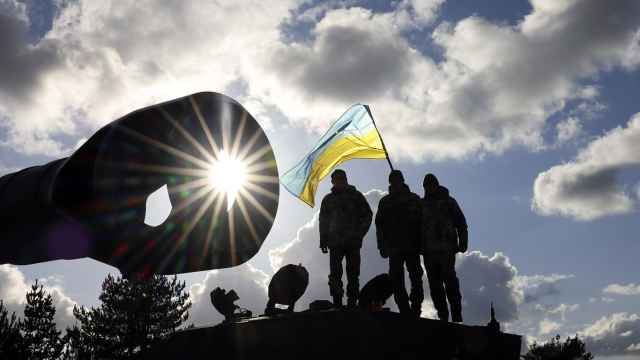Film director Nikita Mikhalkov used to make Russian movies for Russian audiences. But starting with his film “The Barber of Siberia,” released in 1998, Mikhalkov decided to churn out Hollywood blockbusters. His reasoning was simple: Americans, who shell out billions to watch this junk, will love his films if he copied the Hollywood blockbuster model, but with the added feature of the deep Russian soul.
Accordingly, he began making Russian movies for Americans. His latest, “Burnt by the Sun 2. Exodus,” was meant as an answer to Steven Spielberg’s “Saving Private Ryan” — except more authentic. But it has no chance of succeeding, except in the vein of “Springtime for Hitler” — a horrible musical staged as a deliberate failure in Mel Brooks’ “The Producers.”
Post-Soviet Russia has been often compared to Weimar Germany. Each emerged from a lost war, but a defeat was never brought home, giving rise to myths about a sellout and a stab in the back. Both were democratic, but democracy was never embraced by their people, creating fertile ground for radical and nationalistic movements. Both felt that the rest of the world was ganging up on them unfairly. And now, even the economic backdrop is starting to look alarmingly similar.
Many historians have observed that the World War I generation was obsessed with violence. Trench warfare had been hell, but it held strange fascination for the boys who reached adulthood in those trenches. Writers in the interwar period — most of them veterans — wrote muscular prose that waxed nostalgic for wartime camaraderie, simple truths and male virtues, contrasting all that with the complex, cynical civilian life of the 1920s.
But World War II was different. It had been such an orgy of destruction and misery that Western Europe got lastingly fed up with notions of military heroism, martial valor and patriotism.
Today, three generations later, Europe remains remarkably pacifistic. Americans are less so, but even the Pentagon, when recruiting kids for its all-volunteer army, stresses professionalism and character building. The realities of war remain absent from the American mainstream. When you see U.S. soldiers, you are struck by their unwarlike appearance. In their baggy camouflage, enlisted personnel resemble construction workers, while their bespectacled officers look like gray bureaucrats.
Living behind the Iron Curtain, the Soviet Union was in many ways stuck in the 1930s. Today’s Russia retains at least some admiration for the blood and gore of war. War literature and war films were produced in a steady stream throughout the Soviet era, even as they dried up everywhere else in the world. Many young Russians still admire those Soviet works, such as the sweeping five-film epic “Liberation,” released from 1967 to 1971.
Hollywood has revived this tradition of war movies as the United States gets bogged down in endless warfare and as enlistment becomes the only secure employment option for high school graduates. But it is no revival of the 1930s-style portrayal of war. Mikhalkov’s film, on the other hand, for all its special effects and computer graphics, comes straight out of the interwar period. With its focus on disemboweled bodies and violent jokes, it could have been written by German writer Erich Remarque.
Since “Exodus” flopped in Russia, you might even start to hope that Russia and Weimar Germany are finally diverging — until, that is, you see the annual Paratroopers Day orgy in the center of Moscow.
Alexei Bayer, a native Muscovite, is a New York-based economist.
A Message from The Moscow Times:
Dear readers,
We are facing unprecedented challenges. Russia's Prosecutor General's Office has designated The Moscow Times as an "undesirable" organization, criminalizing our work and putting our staff at risk of prosecution. This follows our earlier unjust labeling as a "foreign agent."
These actions are direct attempts to silence independent journalism in Russia. The authorities claim our work "discredits the decisions of the Russian leadership." We see things differently: we strive to provide accurate, unbiased reporting on Russia.
We, the journalists of The Moscow Times, refuse to be silenced. But to continue our work, we need your help.
Your support, no matter how small, makes a world of difference. If you can, please support us monthly starting from just $2. It's quick to set up, and every contribution makes a significant impact.
By supporting The Moscow Times, you're defending open, independent journalism in the face of repression. Thank you for standing with us.
Remind me later.





